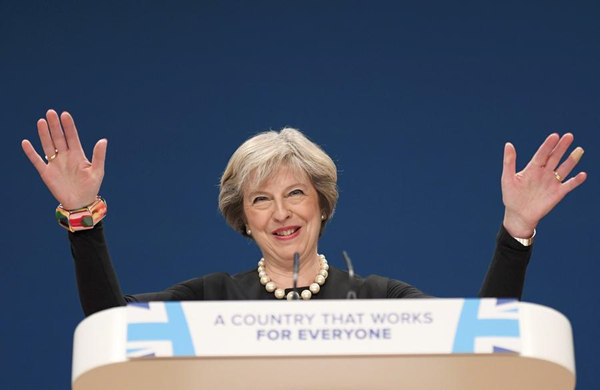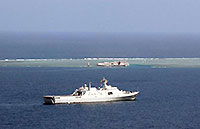British PM May tells Brexit opponents Britain leaving EU unstoppable
(Agencies) Updated: 2016-10-03 02:18British Prime Minister Theresa May opened the Conservative Conference in Birmingham Sunday by telling MPs and opponents of Brexit that they will not stand in the way of Britain leaving the European Union (EU).
 |
|
Britain's Prime Minister Theresa May speaks at the annual Conservative Party Conference in Birmingham, Britain, October 2, 2016. [Photo/Agencies] |
Urging people to "ignore the pessimists", May outlined her vision for an independent Britain free from Brussels control.
In a message directed mainly at the Scottish Nationalists, May said: "We voted in referendum as one United Kingdom and we will negotiate our exit as one united kingdom, and we will leave as one united kingdom."
"There is no opt-out from Brexit and I will never allow divisive nationalists to undermine the pressure union between the four nations of our united kingdom," said May.
She described politicians who want MPs to vote on Brexit in parliament as "insulting the intelligence of the British people", adding "they're not standing up for democracy, they're trying to subvert it."
"Even now some politicians, democratically elected politicians, say the referendum isn't valid. That we need to have a second vote. Others didn't like the result and say they will challenge the decision through the courts," said May, shaking her head as she added: "Come on, the referendum result was clear."
"Parliament put the decision to leave or remain inside the EU in the hands of the people. It is not up to the government to question, quibble or backslide on what we've been instructed to do, but to get on with the job," said the prime minister.
May said it was right that things should not drag on too long, and she was aware the British people would expect to see on the horizon the point at which Britain leaves the EU.
Announcing that the government will before the end of March, 2017, trigger article 50, the process to end Britain's membership of the EU, May said members of parliament will not get a vote on that process.
May told the conference: "It is not up to the House of Commons to invoke article 50, and it is not up to the House of Lords, it is up to the government and the government alone," adding that responsibility for the negotiations with the EU are for the government and nobody else.
Her announcement of a March 2017 deadline will mean the final parting of the ways between Britain and the EU will happen no later than March 2019 -- a year before the next scheduled general election in 2020.
May also confirmed her plan to put before the British Parliament a Great Reform Bill that will transfer all EU legislation into British domestic law. It means the authority of EU law in British courts will end.
May was cheered when she said that existing workers' legal rights introduced under EU legislation will continue to be guaranteed in Britain, adding that those rights would continue "as long as I am prime minister."
Her reassurances that Britain will leave the EU and pave the way for creating new global trading partnerships, earned May loud cheers and applause from a packed conference enter.
She told delegates: "This week we are going to show the country that we mean business."
May said post-Brexit Britain would be a country that passes its own laws, and governs itself.
On the government's future vision after Britain leaves the EU, May said: "We are going to leave the EU and we are going to become a fully independent sovereign country, no longer part of a political union with institutions that can override national governments and courts."
She said an independent Britain would decide for itself how immigration is controlled.
May said Brexit should make Britain think of its role in the wider world, beyond Europe and think of opportunities, with countries such as Canada, China, Singapore, India, Mexico, and South Korea have already told us they welcome talks on future free trade agreements, along with Australia and New Zealand.
"Let me be clear, we are not leaving the EU today to give up control of immigration again and we are not leaving only to return to the jurisdiction of the European Court of Justice," said May, concluding: "A truly global Britain is possible and is in sight."







